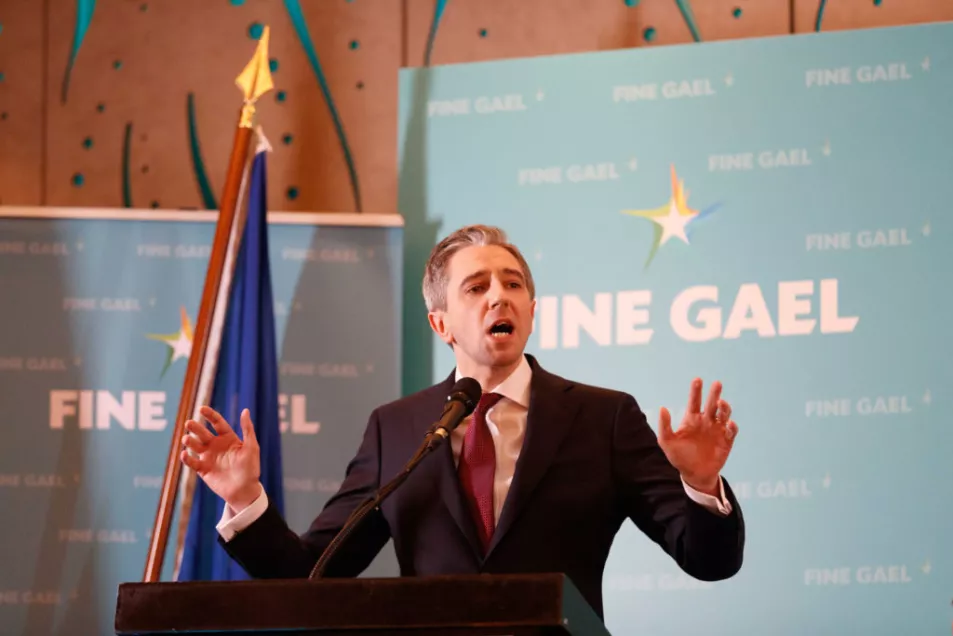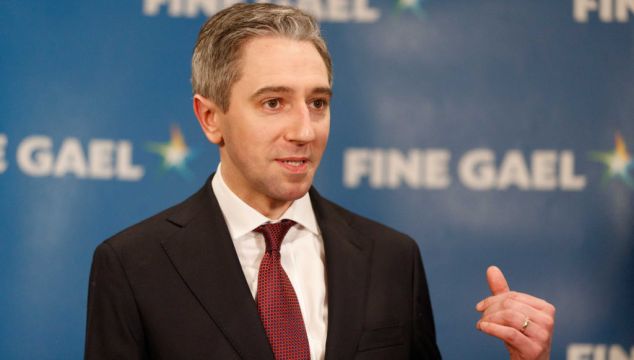Since it became apparent Simon Harris would be our next Taoiseach, opposition parties have used the term 'TikTok Taoiseach' as an insult, but the 37-year-old's social media presence could actually be a huge advantage.
An analysis of politicians and political parties' social media presence during the week revealed Mr Harris was behind only Taoiseach Leo Varadkar when it comes to followers. Mr Harris has 542,700 followers, while his Fine Gael colleague has 788,600 followers.
The research from Mulley Communications highlighted Mr Harris' dominance on TikTok, a platform that boasts a young and diverse audience.
Mr Harris has 95,100 TikTok followers and 172,000 Instagram followers. His TikTok following surpasses the combined followers of all other political parties (excluding Sinn Féin) on the platform, which amounts to 89,360.
Damien Mulley, who published the research, told BreakingNews.ie: "They're knocking him with the term 'TikTok Taoiseach', but he's been doing it for a while and it's working. If you go back a couple of months and even look at his stuff coming up to the Junior Cert and Leaving Cert exams where he was wishing people good luck, and saying not to stress, of course you got people saying 'ugh', and 'thanks Dad'... but most were saying 'cheers Simon', 'thanks for that'.
"It was either positive or neutral mostly. He was Minister for Higher Education, that's what his demographic is, obviously parents as well, but he was reaching the right demographic and using it [social media] properly as well."
The future taoiseach is 37, but Mr Mulley pointed out that TikTok allows him to connect with a young voter base, along with his strong presence on Instagram.

Mr Harris' social media presence really came to the fore in the early stages of the Covid-19 pandemic. The then-minister for health provided updates and answered questions, and many of them resonated with the public.
While the Greystones TD is far from the first Irish politician to try to build up a positive presence on social media, his videos have had more success. Mr Mulley puts this down to a number of factors, including his direct-to-camera interaction, and that he comes across in a casual manner, like a "TikTok native".
"Micheál Martin started well enough on TikTok, but if you look at his recent videos it's clips of him in the Dáil, or clips from elsewhere, and it just doesn't work.
"Leo [Varadkar] comes across more awkward and less socially aware, I think Harris gets people more. I don't know if I'd call it standoffish, but he doesn't appear as comfortable on camera [Varadkar].
"Simon Harris is doing direct-to-camera pieces just for TikTok or Instagram, and I think that's working. You have to know the networks and how they work, and you have to know the audience. I think in a way he has become a TikTok native, most other politicians crowbar what they've done elsewhere into it, and it just doesn't work.
"He was one of the first to get there [TikTok] and his numbers are quite good."
He added: "Harris has got way ahead on the modern social networks than most other politicians, and it's working now.
"How that transfers to being taoiseach and leader of Fine Gael, we'll see what happens there, but he'll be a very busy man, so we'll see if he's going to be able to do the direct-to-camera pieces any more.
"Harris seems like someone you could have a chat with, that's the persona he's created on social media anyway, and it seems to work. You need that nowadays on social networks, it's more informal. They have their rules of engagement, he does get it, and I think those in Fianna Fáil who are looking for a change or an increase in the polls will follow."
When it comes to parties' social media, there is a clear winner.
Sinn Féin leads the way with 925,900 followers, far ahead of People Before Profit in second place, with 170,200 followers. The party also has more followers than all the other parties combined (769,910).
Mr Mulley's research also highlighted Sinn Féin's growth. The current figure of 925,900 is a huge jump from the 421,600 followers the party had in 2020.
It is not a surprise as Sinn Féin has honed its social media strategy in the last few years, and the party's online presence was seen as a big factor in its success in the 2020 general election.
However, Mr Mulley said senior Sinn Féin figures, like leader Mary Lou McDonald, have some catching up to do when it comes to TikTok.
"Sinn Féin got there early as well, but Mary Lou McDonald isn't on TikTok, and there are other senior Sinn Féin figures not on it.
"Her profile on the other networks is really strong, but that's definitely a space she is missing. Micheál Martin joined months ago. You have Fine Gael and Fianna Fáil doing regular TikTok updates, so I would wonder if Mary Lou is going to have her own account. She does the stuff on the main Sinn Féin account. It's a very busy account.
"It would be worth doing for her. You could bring followers from your other accounts onto TikTok as well. It allows you to engage directly with a demographic that is under-served in elections."
Sinn Féin leads in total views for the last 20 TikTok videos. Mr Mulley pointed to their interaction with people who comment on their posts as a big positive, and something that all political parties should do.
"The party does well in terms of interaction, not with everyone obviously, but they do interact and sometimes with negative comments too. There is back-and-forth, which is what you should be doing.
"All the brands tell you to create a community, and the algorithm tells you that you have to interact, and they're doing it."
In a deeper analysis of parties' engagement on TikTok, Mr Mulley found Sinn Féin still receives the best feedback, albeit with a higher level of criticism of late.
"If you look at Sinn Féin on all platforms, there's huge engagement. It's on issues like housing and health. Being critical of housing policy will get you engagement. That gives you an advantage.
"Of late, with changes to their policy on the hate speech Bill and some other things, the comments are going against them with more negativity on their feeds, and people accusing them of being populist."

In one interesting trend, he noted that Fianna Fáil gets a lot more negative engagement over Government policy than Coalition partners Fine Gael.
"There is a stark difference in comments on Fine Gael's TikTok and Fianna Fáil's TikTok, it's brutal on the Fianna Fáil updates, less so on Fine Gael. Fine Gael still get plenty of negative comments, but in terms of vitriol, Fianna Fáil is worse."
He said both parties receive a lot of engagement when they counter or criticise Sinn Féin.
However, the fact only Fine Gael have ruled out a coalition with Ms McDonald's party may be resulting in more scepticism of Fianna Fáil.
"They're both dancing around it - Sinn Féin and Fianna Fáil - but Fianna Fáil was the party who said they'd never go into a coalition with Fine Gael, and they're happy in government now.
"When Fianna Fáil do attack Sinn Féin, there are comments like 'but you'll have to go into government with them'. Also, when people's friends are criticising a party, the influence of the algorithm contributes to it."
Mr Mulley's research also noted a surge in popularity for the Social Democrats and People Before Profit.
Social Democrats leader Holly Cairns and Richard Boyd Barrett and Paul Murphy of PBP are other politicians who "get it" when it comes to social media, Mr Mulley said.
Politicians interacting with people online is one way electioneering is going in the future, and it's starting to happen already.
Social media and politics really became inextricably linked around the time of the 2016 US presidential election and the Brexit referendum the same year, when Facebook's role was undeniable.
Mr Mulley said politicians who still sneer at new platforms, and believe 'TikTok Taoiseach' is an insult, will come to regret it.
"The older demographic always gets out to vote in numbers. They're on Facebook, so it's still important for parties to focus on that to keep things ticking over.
"To get extra votes or to stop losing votes, you have to go after the likes of Instagram and TikTok. First-time voters can be targeted with the video pieces on TikTok.
"Politicians interacting with people online is one way electioneering is going in the future, and it's starting to happen already."







